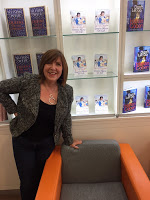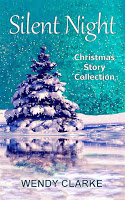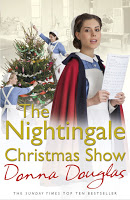Wendy Clarke & Donna Douglas: From Short Story To Novel, And Novel To Short Story
13 November 2017

Today we’re joined on the blog by Wendy Clarke and Donna Douglas sharing their experiences of moving from short story writing to novels, and vice versa.
Wendy Clarke is a writer of women’s fiction. Her work
regularly appears in national women’s magazines such as The People’s Friend, Take a Break Fiction Feast and Woman’s Weekly. She has also written
serials and a number of non-fiction magazine articles.
regularly appears in national women’s magazines such as The People’s Friend, Take a Break Fiction Feast and Woman’s Weekly. She has also written
serials and a number of non-fiction magazine articles.
Wendy has published three collections of short stories, Room in Your Heart, The Last Rose and Silent
Night and has just finished writing her second novel.
Night and has just finished writing her second novel.
Wendy lives with her husband, cat and step-dog in Sussex and
when not writing is usually dancing, singing or watching any programme that
involves food!
when not writing is usually dancing, singing or watching any programme that
involves food!
You can find out more about Wendy on her website https://wendyswritingnow.blogspot.co.uk/, on facebook at https://www.facebook.com/WendyClarkeAuthor/, or by following her on twitter @WendyClarke99
Donna Douglas is the Sunday Times bestselling author
of the Nightingale novels, et in an East End hospital in 1930s. She has
recently published the second in the Steeple Street series, about a district
nurse in 1920s Yorkshire. A born Londoner, Donna now lives in York with her
husband and family. In her spare time she enjoys reading, going out for coffee
and cocktails, and binge-watching TV box sets.
of the Nightingale novels, et in an East End hospital in 1930s. She has
recently published the second in the Steeple Street series, about a district
nurse in 1920s Yorkshire. A born Londoner, Donna now lives in York with her
husband and family. In her spare time she enjoys reading, going out for coffee
and cocktails, and binge-watching TV box sets.
You can find out more about Donna on her website at http://www.donnadouglas.co.uk/
on facebook at www.facebook.com/donnadouglasauthor or by following her on twitter @DonnaAuthor or on Instagram:
donnaauthor.
donnaauthor.
Wendy Clarke – From Short Story to Novel
I sat down in front of the computer and looked at the blank
screen. How hard can this be? I
thought. I’ve written two hundred short
stories so writing a novel will be the same… just longer.
screen. How hard can this be? I
thought. I’ve written two hundred short
stories so writing a novel will be the same… just longer.
How wrong could I be! The difference between a short story
and a novel is as great as between a puddle and an ocean or my corner shop and
the supermarket on the outskirts of town. The clue is in the name – a short
story is, well, short. The other isn’t and that, I soon realised, was the whole
problem.
and a novel is as great as between a puddle and an ocean or my corner shop and
the supermarket on the outskirts of town. The clue is in the name – a short
story is, well, short. The other isn’t and that, I soon realised, was the whole
problem.
When I write my magazine stories, I start off with the seed
of an idea and see where it will take me. Sometimes I know how the story will
end but often I don’t. Whichever it is, the journey between beginning and end
is a short one and it’s never long before l know where my characters are taking
me and the finishing line is always in sight. In contrast, it soon became clear
to me when I started the novel, that muddling through with a vague idea in my
head was not going to work. I would need to plan – at least a bit. The word
sent shivers down my spine but, with two interweaving timeframes, I was going
to need all the help I could get. So I wrote down some chapter headings and
scribbled a few notes under each one. It gave me a basic framework to work from
and made it easier when it came to write the dreaded synopsis.
of an idea and see where it will take me. Sometimes I know how the story will
end but often I don’t. Whichever it is, the journey between beginning and end
is a short one and it’s never long before l know where my characters are taking
me and the finishing line is always in sight. In contrast, it soon became clear
to me when I started the novel, that muddling through with a vague idea in my
head was not going to work. I would need to plan – at least a bit. The word
sent shivers down my spine but, with two interweaving timeframes, I was going
to need all the help I could get. So I wrote down some chapter headings and
scribbled a few notes under each one. It gave me a basic framework to work from
and made it easier when it came to write the dreaded synopsis.
Once I got started, I found another big difference was to do
with my characters. Most short stories have at least two main characters. That
means a minimum of 400 characters have paid me a short visit over the last few
years. They often stay a day or two and if they bore me, I know I can throw
them out and invite someone else. With the novel, a whole cast of characters
turned up with their suitcases, expecting to live with me for several months if
not years! What if I grew tired of them? What if they wouldn’t do what I
wanted? I needn’t have worried. I quickly grew very fond of my little family
and was sad when I had to eventually say goodbye to them.
with my characters. Most short stories have at least two main characters. That
means a minimum of 400 characters have paid me a short visit over the last few
years. They often stay a day or two and if they bore me, I know I can throw
them out and invite someone else. With the novel, a whole cast of characters
turned up with their suitcases, expecting to live with me for several months if
not years! What if I grew tired of them? What if they wouldn’t do what I
wanted? I needn’t have worried. I quickly grew very fond of my little family
and was sad when I had to eventually say goodbye to them.
The biggest problem I had when moving from short story to
novel, however, was that I’m used to rewards. In a normal short story year, I
have the satisfaction of writing ‘The End’ scores of times and sales to
celebrate. The novel was more like a marathon with no guarantee of a medal at
the end of it. Believe me – it was hard! I’ve learnt that writing a novel
requires stamina and determination. You have to love both your story and your
characters and want to share time with them even if there seems to be no light
at the end of the tunnel.
novel, however, was that I’m used to rewards. In a normal short story year, I
have the satisfaction of writing ‘The End’ scores of times and sales to
celebrate. The novel was more like a marathon with no guarantee of a medal at
the end of it. Believe me – it was hard! I’ve learnt that writing a novel
requires stamina and determination. You have to love both your story and your
characters and want to share time with them even if there seems to be no light
at the end of the tunnel.
Luckily for me, I did.
Donna Douglas – From Novel to Short Story
My new novel, The Nightingale Christmas Show, is out
this week. It’s my ninth Nightingale book, and the fourth set during the
festive season, so this year I decided to try something different. Rather than
writing one novel, I thought it might be fun to put together a collection of themed
short stories.
this week. It’s my ninth Nightingale book, and the fourth set during the
festive season, so this year I decided to try something different. Rather than
writing one novel, I thought it might be fun to put together a collection of themed
short stories.
It
seemed like a good idea at the time. And in my naivete, I thought six separate
stories might actually be easier than writing a lengthy novel. I mean, short
stories are quick and easy to do, aren’t they?
seemed like a good idea at the time. And in my naivete, I thought six separate
stories might actually be easier than writing a lengthy novel. I mean, short
stories are quick and easy to do, aren’t they?
Well,
no. As I found out, each short story was like a mini novel in itself, needing
its own narrative arc, theme, voice, etc. And since each of the stories was
around 10,000 words long, they weren’t that short, either!
no. As I found out, each short story was like a mini novel in itself, needing
its own narrative arc, theme, voice, etc. And since each of the stories was
around 10,000 words long, they weren’t that short, either!
Just
to make things even more difficult for myself, I decided to interlink the
stories. Each of the six tales recounts the same event – an amateur show at a
hospital during the first Christmas after the war – from a different viewpoint.
There’s the war-weary Matron, Kathleen Fox, and her ambitious new Assistant
Matron Charlotte Davis (a young woman with a dreadful secret). Then there are
two ward sisters, warm-hearted Violet and fiercely competitive Miriam Trott.
Finally we have two nurses, scatty, man-mad Daisy and Peggy, who struggles to
reconcile her own desires with those of her controlling husband.
to make things even more difficult for myself, I decided to interlink the
stories. Each of the six tales recounts the same event – an amateur show at a
hospital during the first Christmas after the war – from a different viewpoint.
There’s the war-weary Matron, Kathleen Fox, and her ambitious new Assistant
Matron Charlotte Davis (a young woman with a dreadful secret). Then there are
two ward sisters, warm-hearted Violet and fiercely competitive Miriam Trott.
Finally we have two nurses, scatty, man-mad Daisy and Peggy, who struggles to
reconcile her own desires with those of her controlling husband.
Since
the six characters interact with each other, and drop in and out of each
other’s stories, this proved to be quite a logistical challenge, involving a lot
of wall space and great deal of colour-coded Post-its. So, for instance, when
ward sister Violet Tanner receives some bad news just before the show’s first
rehearsal during her own story, I had to make sure she was suitably preoccupied
when I recounted the same event in the Assistant Matron’s story.
the six characters interact with each other, and drop in and out of each
other’s stories, this proved to be quite a logistical challenge, involving a lot
of wall space and great deal of colour-coded Post-its. So, for instance, when
ward sister Violet Tanner receives some bad news just before the show’s first
rehearsal during her own story, I had to make sure she was suitably preoccupied
when I recounted the same event in the Assistant Matron’s story.
 |
| Donna’s helpful post-its |
As
you can imagine, it was a bit hair-tearing at times, but I got there in the
end. And the process actually proved really interesting. The finished result is
not so much a collection of short stories as a deconstructed novel, with all
the viewpoints that are general woven together pulled apart into separate
strands. This meant I could give each story its own unique tone, from Daisy’s
fun quest to bag herself a handsome young doctor, to Charlotte’s secret heartache
over her dark past. So whether you’re looking for a laugh or something
tear-jerking, hopefully there’s a short story for every mood!
you can imagine, it was a bit hair-tearing at times, but I got there in the
end. And the process actually proved really interesting. The finished result is
not so much a collection of short stories as a deconstructed novel, with all
the viewpoints that are general woven together pulled apart into separate
strands. This meant I could give each story its own unique tone, from Daisy’s
fun quest to bag herself a handsome young doctor, to Charlotte’s secret heartache
over her dark past. So whether you’re looking for a laugh or something
tear-jerking, hopefully there’s a short story for every mood!
I
had a great deal of fun writing it (I guess I can say that now it’s all over!)
and I hope you enjoy reading it.
had a great deal of fun writing it (I guess I can say that now it’s all over!)
and I hope you enjoy reading it.
Thank you Wendy and Donna. It’s fascinating her hear how different writers approach writing in different forms.
Wendy’s collection, Silent Night, is available now
Their first Christmas
without Paula. The thought made his heart ache. He didn’t know how he was going
to do it, but he had made up his mind that, whatever happened, he would try and
make it the same as it had always been. For the children’s sake… for all
their sakes.
without Paula. The thought made his heart ache. He didn’t know how he was going
to do it, but he had made up his mind that, whatever happened, he would try and
make it the same as it had always been. For the children’s sake… for all
their sakes.
Silent Night, is a collection of short stories with a
Christmas theme. All thirteen stories have previously been published in
national magazines. If you like stories with emotional depth and a satisfying
ending, then these stories will not fail to leave you unmoved.
Christmas theme. All thirteen stories have previously been published in
national magazines. If you like stories with emotional depth and a satisfying
ending, then these stories will not fail to leave you unmoved.
Andrew and his children are grieving. Can he make this a
Christmas his late wife would have been proud of?
Christmas his late wife would have been proud of?
Bella needs to get away from it all but her Christmas
cottage by the sea holds more than a few surprises.
cottage by the sea holds more than a few surprises.
Christmas Eve, a starry night and two young men who have
more in common than they realise.
more in common than they realise.
The stories in this collection are a window into the lives
of ordinary people at this special time of year. They offer hope, comfort and the
knowledge that the spirit of Christmas is often found within ourselves.
of ordinary people at this special time of year. They offer hope, comfort and the
knowledge that the spirit of Christmas is often found within ourselves.
And The Nightingale Christmas Show from Donna Douglas is also available now
It’s Christmas 1945, and Matron Kathleen Fox is faced
with the daunting task of putting the Nightingale Hospital back together after
six long years of war. In an effort to restore morale, she decides the staff
should put on a Christmas show for the patients. She hands the task over to her
ambitious Assistant Matron, Charlotte Davis. But it isn’t long before Charlotte
is ruffling feathers among the rest of the staff…Can the nurses of the
Nightingale overcome the shadows of the past and pull together in time to save
the show?
with the daunting task of putting the Nightingale Hospital back together after
six long years of war. In an effort to restore morale, she decides the staff
should put on a Christmas show for the patients. She hands the task over to her
ambitious Assistant Matron, Charlotte Davis. But it isn’t long before Charlotte
is ruffling feathers among the rest of the staff…Can the nurses of the
Nightingale overcome the shadows of the past and pull together in time to save
the show?






